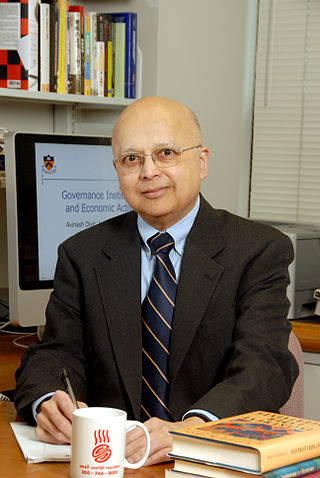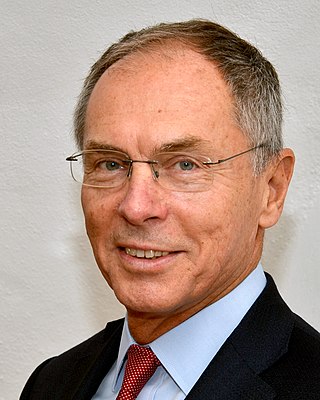Related Research Articles
Colin Farrell Camerer is an American behavioral economist, and Robert Kirby Professor of Behavioral Finance and Economics at the California Institute of Technology (Caltech).

Avinash Kamalakar Dixit is an Indian-American economist. He is the John J. F. Sherrerd '52 University Professor of Economics Emeritus at Princeton University, and has been Distinguished Adjunct Professor of Economics at Lingnan University, senior research fellow at Nuffield College, Oxford and Sanjaya Lall Senior Visiting Research Fellow at Green Templeton College, Oxford.He was the brilliant economist

Jean Tirole is a French economist who is currently a professor of economics at Toulouse 1 Capitole University. He focuses on industrial organization, game theory, banking and finance, and psychology. In particular, he focuses on the regulation of economic activity in a way that does not hinder innovation while maintaining fair rules.

David E. Bloom is an American author, academic, economist, and demographer. He is a Professor of Economics and Demography at the Harvard School of Public Health, and director of the Program on the Global Demography of Aging. He is widely considered as one of the greatest multidisciplinary social science researchers of the world.

Sir Richard William Blundell CBE FBA is a British economist and econometrician.
Shlomo Weber is an economics professor and president, New Economic School in Moscow, Russia; Academic Director of the Center for Study of Diversity and Social Interactions at NES; Robert H. and Nancy Dedman Trustee Professor of Economics Department of Economics, Southern Methodist University.

Jan Švejnar is a United States-based, Czech-born economist. He was a candidate for the 2008 election of the President of the Czech Republic.
Paul Lewis Joskow is an American economist and professor. He became President of the Alfred P. Sloan Foundation on January 1, 2008. He is also the Elizabeth and James Killian Professor of Economics, Emeritus at MIT. He has served on the MIT faculty since 1972. From 1994 through 1998 he was Head of the MIT Department of Economics. From 1999 through 2007 he was the Director of the MIT Center for Energy and Environmental Policy Research. Since rejoining in 2018 from his 1988-2007 term, Professor Joskow is Research Associate on the National Bureau of Economic Research (NBER).

Armin Falk is a German economist. He has held a chair at the University of Bonn since 2003.

Francine Dee Blau is an American economist and professor of economics as well as Industrial and Labor Relations at Cornell University. In 2010, Blau was the first woman to receive the IZA Prize in Labor Economics for her "seminal contributions to the economic analysis of labor market inequality." She was awarded the 2017 Jacob Mincer Award by the Society of Labor Economists in recognition of lifetime of contributions to the field of labor economics.
William Bentley MacLeod is a Canadian-American economist. He is Lecturer with Rank of Professor and Research Scholar at Princeton University, and the Sami Mnaymneh Professor of Economics and Professor of International and Public Affairs Emeritus at Columbia University. He is a specialist in the fields of labor economics and health economics, and law and economics.
Duncan K. Foley is an American economist. He is the Leo Model Professor of Economics at the New School for Social Research and an External Professor at the Santa Fe Institute. Previously, he was Associate Professor of Economics at MIT and Stanford, and Professor of Economics at Columbia University. He has held visiting professorships at Woodrow Wilson School at Princeton University, UC Berkeley, and Dartmouth College, as well as the New School for Social Research.

John Maron Abowd is the Associate director for research and methodology and chief scientist of the US Census Bureau, where he serves on leave from his position as the Edmund Ezra Day Professor of Economics, professor of information science, and member of the Department of Statistical Science at Cornell University.
Barry Raymond Chiswick, born in 1942, is an American economist and professor of economics at the Columbian College of Arts and Sciences, George Washington University. He has done extensive research on labor economics, human resources and income distribution. His "fundamental contributions to the economic analysis of migration" were rewarded with the IZA Prize in Labor Economics in 2011, with George J. Borjas as co-recipient.
Carl Finley Christ was an American economist and a Professor Emeritus of Economics at Johns Hopkins University. He is known for his contributions in econometrics, including an early popular textbook.

The Princeton University Department of Economics is an academic department of Princeton University, an Ivy League institution located in Princeton, New Jersey. The department is renowned as one of the premier programs worldwide for the study of economics. The university offers undergraduate A.B. degrees, as well as graduate degrees at the Ph.D. level. It is often considered one of the "big five" schools in the field, along with the faculties at the University of Chicago, Harvard University, Stanford University, and MIT. According to the 2023-2024 U.S. News & World Report, its graduate department is ranked as the joint No. 4 in the field of economics, in a four-way tie between it, the University of Chicago, Yale University, and the University of California, Berkeley.
Vincent P. Crawford is an American economist. He is a senior research fellow at the University of Oxford, following his tenure as Drummond Professor of Political Economy from 2010 to 2020. He is also research professor at the University of California, San Diego.
Samuel S. Kortum is an American economist and currently James Burrows Moffatt Professor of Economics at Yale University. His research focuses on international trade and industrial organisation.
Helmut Bester is a German economist who was a professor of economics at the Free University of Berlin until 2020. His research focuses on microeconomic theory, contract theory and industrial organisation.
The 2021 Nobel Memorial Prize in Economic Sciences was divided one half awarded to the American-Canadian David Card "for his empirical contributions to labour economics", the other half jointly to Israeli-American Joshua Angrist and Dutch-American Guido W. Imbens "for their methodological contributions to the analysis of causal relationships." The Nobel Committee stated their reason behind the decision, saying:
"This year's Laureates – David Card, Joshua Angrist and Guido Imbens – have shown that natural experiments can be used to answer central questions for society, such as how minimum wages and immigration affect the labour market. They have also clarified exactly which conclusions about cause and effect can be drawn using this research approach. Together, they have revolutionised empirical research in the economic sciences."
References
- 1 2 "Curriculum Vitae" (PDF).
- ↑ "Henry Farber". Princeton University.
- 1 2 "Henry Farber - Industrial Relations Section". www.irs.princeton.edu.
- ↑ CERGE-EI (18 June 2013). "Interview: Prof Henry Farber (Princeton) Discusses Labor Economics" – via YouTube.
- ↑ "Curriculum vitae" (PDF).